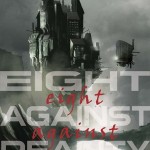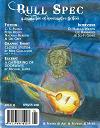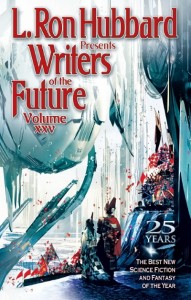written by Frank Dutkiewicz
Welcome to the first issue of Redstone Science Fiction. Thanks for dropping byâ€.
Thus opens the newest pro-market, SFWA wannabe, magazine to hit the speculative market scene. It is the brainchild of Michael Ray (previously interviewed here on Diabolical Plots) and Paul Clemmons. Mr Ray has been waging an ambitious ‘get out the word’ campaign for his project. He has used facebook, blogs, emails, and my favorite writers workshop, hatrack, to alert as many lovers of speculative fiction of its coming arrival and to solicit material for its pages. Like a wise man bearing gifts from the east, I followed the newest star shining in the skyâ€.and I wasn’t alone.
They received over 200 submissions for their first call, including one of mine. As of May 11th, they accepted 10 of them for publication (not one of mine), with one they were on the bubble on. Since that time, they have re-opened and re-closed for submissions, its editors choosing to stick to a strict reading schedule.
Their debut issue has two of their earliest acceptances, as well as a couple of essays and a few interviews.
The Fiction
Raising Tom Chambers by Daniel Powell
Penelope Crump may be the last person alive on Earth. A devastating plague has wiped out the human population, leaving Penelope to fend for herself. Surviving a plague is one thing, overcoming loneliness is quite another. The Astras, little parasitic aliens brought back from Mars, are affected by their host’s sudden disappearance. Penelope is learning that even when you’re the only one left, you needn’t be alone.
Raising Tom Chambers follows Penelope’s life after she awakes from a disease that claims most of humanity. Doing her best to keep on, the last of the Astras find her. They need humans to survive. Penelope tries to stay indoors until the winter cold takes the last of them but one manages to latch onto her ribcage. At first she tries to pry it off, then does her best to get used to it. Like a lapdog that is always at its master’s side, Penelope becomes attached to the parasite that won’t let go. She names it Tom Chambers (long story) and the two live out the rest of their lives as the remaining members of their species.
The first third of Raising Tom Chambers was all back-story. We learn of who Penelope is, and of the couple of people she met, before they keeled over. The info of what the Astras are gets crowbar in, mid-stream. We discover that they were brought home on the second to last manned trip to Mars in 2013 (How did I miss the first mission?), and like a lamprey eel, they need a host to survive, but instead of fish, human is the limit of their diet (How’d they survive on Mars?). Which leaves for some mighty big holes in the premise.
The story is told from a very distant perspective, as if Penelope’s life is being examined through a TV news magazine profile. It is more of a fictional op-ed than it is a fictional life experience. The portion involving the Astra parasite is glossed over and Penelope’s life with Tom is compressed. More was said on how the Martian got its name than the effect it had on Penelope.
I believe I recalled reading that Raising Tom Chambers was the first story the entire staff of Redstone agreed upon. Fortunately for Mr Daniels, I am not a member of the editorial committee. It is obvious that they weren’t concerned about opening with an upbeat tale for their launch.
I love Sci-Fi, and eat up post-apocalyptic tales like they’re potato chips, but this story I found depressing with a capital D. Even though Raising Tom Chambers is about mankind’s last survivor, I can’t classify it as a dark tale. I believe gray is the right shade for it.
Freefall by Peter Roberts
How long is forever? A crewmember of a shattered ship would love to know the answer. Locked in an isolation chamber from an injury, she is adrift in space, waiting for an unlikely rescue, the chamber’s power to fail, or the end of the timeâ€whichever comes first.
Freefall starts off with a nameless character in the midst of insanity. She doesn’t know where she is or what has happened to her. Forced by immobility, she pieces together her sanity and the events that led her to her horrifying predicament. The chamber in which she is in allows her mind to be functional but nothing else, the equivalent of experiencing a complete paralysis with a fully conscience mind.
Freefall is good sci-fi. It presents a potential future problem that a modern person can identify with. Although I liked the idea, there were a few things that bugged me.
I didn’t understand the voices. No explanation was provided and I failed to see how she was able to hear them. I didn’t get why the MC didn’t have a name either. Author’s discretion, I suppose.
Freefall is a good example of how to write a story in so few words. Nice piece.
Essays
The Future Imperfect by Sarah Einstein
The world is changing. Technology has changed it in ways that would make it seem alien to our grandparents. Phones that aren’t secured to a wall but instead are as mobile as their owners. A device that can get us anywhere we desire, saving us the trouble of asking for directions or figuring out to refold a map the right way. Technology has made things easier for us, but does it attempt to make it better? How about the unlucky of us that are disabled? What if technology chose to exploit the imperfect of society instead of the imperfect exploiting technology?
Sarah Einstein examined this possibility while listening to Anne McCafferty’s masterpiece The Ship Who Sang. For those that are unfamiliar with it, society has decided to use the healthy minds of damaged people to make things better for the rest of us. The very notion bothered Ms Einstein, concerned that Ms McCafferty’s novel may be a foretelling of things to come.
Sarah’s deep thoughts on the subject set up Redstone’s first contest, The Future Imperfect. The editors seek submissions that deal with futures that incorporate the disabled. The criteria for the contest appears to be wide open, but it needs to about the handicap (a future disability would be welcomed, I believe).
The crux of Sarah’s concern (I’m guessing here) is the disabled are still shunned. Technological improvements in many fields leap forward, but any real advancements that help the ones in need, seem to crawl. That frustration is compounded when you have a loved one that suffers with an infliction. We land a man on the moon and bring him back safely, why can’t we make people whole again? Tweak this apparent insensitivity with a ‘sacrifice the few for the benefit of many’ philosophy and a future like McCafferty’s becomes a reality. Interesting thought, but highly unlikely.
Technology goes where the money is. Ipod’s sell well, and are improved constantly, because everyone wants one. A wheelchair lift for a car with a low gas mileage? Sorry, not a big market.
Truth is society hasn’t the stomach to inflict needless pain on another. Keep their inflictions hidden and ignore it, sure. The reason is the disable make the healthy uncomfortable. We see a blind man being led by a seeing eye dog and say ‘but from the grace of god go I’.
I submit that mankind would bend over backward for the disabled, if we thought we could end their affliction for good. If an elixir were presented that could make every person whole, but for a price, we would collectively break out our checkbooks and ask ‘how much’? However, if told we could all ride for free, and we would never need to burn an ounce of fossil fuel again, as long as we were willing to harvest the brains of a few of the lame, we would all say ‘No thanks, we’ll walk’.
Nevertheless, I do like the premise of the upcoming contest. Can’t wait to see what wins.
Barsoom or Bust! by Henry Cribbs
Quick! Name the first person to go to Mars. Times up! John Carter, confederate soldier transported to the planet in Edgar Rice Burroughs very first novel, A Princess of Mars.
Barsoom, for those who are unaware that Mr Burroughs wrote something other than Tarzan, is what his fiction characters call their world in his Martian Tales series. It was created almost a century ago and is on the way to becoming Pixar’s next big project. Which should make fans of the series excited, until they see how Hollywood butchers the story.
Henry Cribbs points out that fact, and I can’t help but agree with him. Burroughs collective works, in the early 20th century, would likely be a tough sell if written today. They’re filled with gratuitous violence and had characters with a chauvinistic spin. Burroughs is likely the master of the popular literary style, pulp. Young males love reading it but don’t expect accolades from the critics of today.
The influence that E G Burroughs has on the speculative fiction genres cannot be questioned. He is perhaps one of the first to create an entirely new world to support his tales, complete with its own geography, culture, and unique life. He may be the first author who had readers that couldn’t wait to get their hands on the next book. Carl Sagan admitted his love for the series, perhaps sparking a love with a greater universe.
Mr Cribbs has every right to be nervous about Hollywood interpretation of the late Burroughs classic. It could be they do it justice, as they did Tolkien’s Lord of the Rings, but I doubt it. I do know if Pixar is handling the project, we will likely get something worth watching.
Interviews
An Interview with Lou Anders by David Alastair Hayden
There are plenty of people in every industry that rise to the top. They have an inside track of trends, and set the standard for everyone else. Than there is the person those people look up to. I wouldn’t know who that person is in the speculative fiction market, but I’d bet Lou Anders would be a leading candidate for the position.
If your desire is to become an award-winning author, Lou Anders is likely one of the people you will need to deal with along the way. Mr Anders has a very impressive resume and is one of those saints that keep the speculative fiction market alive.
In Mr Hayden’s interview, Mr Anders speaks of the trends in speculative fiction market. I was impressed on how well he knows the authors of today and which ones are the leading writers in the offshoot genres of the industry. He speaks of what makes an anthology worth reading and what it takes to get a book ready for the bookshelf. Mr Anders wisely stresses the importance of a good cover artist. As one that found all my favorite artists trolling through the bookstores, great writers get you to buy more of their books, it takes a great cover to get you buy their first one.
I enjoyed reading about Lou Anders. Nice interview.
An Interview with Kittyhawk by Michael Ray
Kittyhawk is an artist. She does the cover for Redstone’s first issue. Michael Ray proudly introduces her and asks what she has been up to. Judging by her upcoming schedule, she is a very busy girl.
Interview with Joel Hardy by Michael Ray
Joel Hardy has a job that I wouldn’t mind trying out. As an independent contractor for NASA, he is one of the lucky that lends his talents to the International Space Station. Mr Hardy tells Redstone of the work he does for NASA and shares his thoughts on the future of space.
The Skinny
I commend Michael Ray and Paul Clemmons. To start up a new pro-paying market when so many publications are pulling up their stakes is music in the ears of the writer and reader in me. They really want Redstone to be a SFWA qualified magazine. I hope they get their wish. Speculative fiction is the richest literature out there, in my opinion. So much can be done when the realm of possibility has no limits.
For a magazine to make a mark on the industry, its content should leave a mark on the reader. I thought the essays and interviews in this debut issue were interesting and enjoyable. The two fictional pieces? Not so much. The flash fiction I thought was okay, but it was the short piece. It could be just a matter of taste but if others feel the way I do, Redstone could have a rough time building a readership.
Now I could stress how well I thought the essays and interviews were done but not a lot of people pick up Sci-Fi magazines for its non-fictional content. That’s like if Playboy dressed all the woman in muumuus, but made up for it with great articles.
I think, the opening story to the debut issue of the next major magazine should have been from an author of star power, or at least a story that stood out above all the rest. I mean Nebula consideration good. Granted, it is just my opinion. Perhaps Raising Tom Chambers is Redstone’s Marilyn Monroe, a real knockout. Maybe it’s just not my type. That still doesn’t dismiss the lack of fictional content. Redstone Issue # 1 had a total of 5000 words of Sci-Fi in it. Two stories, that’s it. It will need to, at least, double that amount. 4 stories each issue, minimum. A magazine meant to capture the imagination of readers should have half (or more) of its pages devoted to imaginative content. A fiction magazine needs fiction.
Redstone can be excused, partially, because they are a monthly publication. Money could be the issue as well. Easy for me to say that they should shell out more cash when I’m not the one paying the bills, but a magazine needs readers first. If a limited budget is the issue, I suggest they scale back their pay rates. I know the editors want their magazine to be a professionally paying one, but I am betting the quality of the submissions they receive won’t dip all that much if they lower their rate a penny or two a word. Build readership up first, then raise the rates. I would also recommend soliciting material from a known name in the industry. Don’t wait for one to submit to the magazine, ask if they would be willing to part with one of their gems. Plenty of successful authors with a fan base. Start at the top and work your way down. A novel excerpt might also help. Free advertising for a grateful publisher (you do know Lou Anders, after all.)
I hope Redstone takes off. I really did enjoy Henry Cribbs’ essay and David Hayden’s interview with Lou Anders. I wish I could tell you I enjoyed the fiction as much. A lot of ambitious projects like Redstone hit the floor running, eager to head to the front of the line in the speculative fiction race. Perhaps the editors thought it would be wise to stretch first.
![s551815767_143845_1164[1]](https://www.diabolicalplots.com/wp-content/uploads/2009/08/s551815767_143845_11641.jpg)







 Yes, I know I am a year behind but I bought this book before 25 became available AND this edition can be found in the stores today. So for readers that like to browse and choose the reading material from books on a shelf, this review is for you.
Yes, I know I am a year behind but I bought this book before 25 became available AND this edition can be found in the stores today. So for readers that like to browse and choose the reading material from books on a shelf, this review is for you.